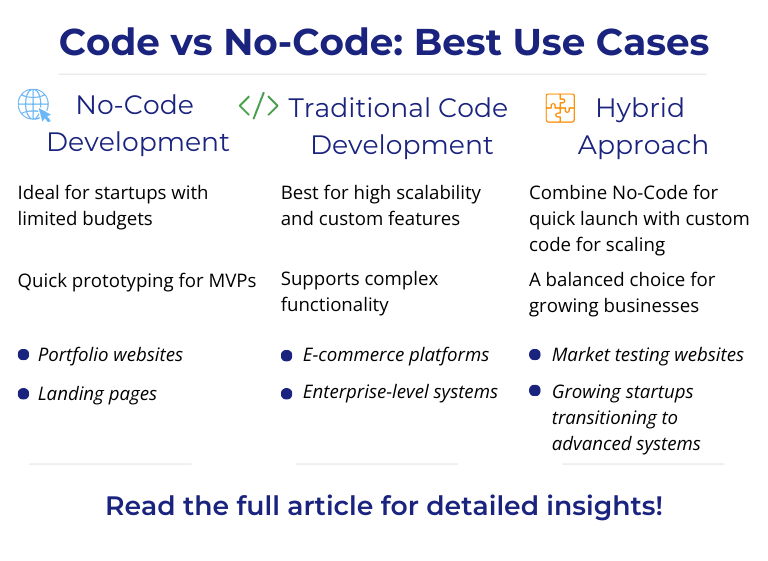Web development
Software development
CMS integration
Product strategy
Performance optimization
UI/UX Design
Code vs No-Code Website Development in 2024: Which is the Smart Move?
Iliya Timohin
2024-12-30
In 2024, the landscape of website development is more diverse than ever, offering both traditional coding and no-code solutions to cater to a wide range of needs. For entrepreneurs, small business owners, and startups, choosing the right approach can significantly impact their digital presence and business success. This article explores the pros and cons of code versus no-code website development, helping you make an informed decision based on your specific needs, goals, and resources.

Empowering Entrepreneurs: No-Code's Accessibility Revolution
No-code platforms have transformed how entrepreneurs and small businesses approach web development. These tools empower individuals without extensive technical knowledge to create functional and visually appealing websites. With drag-and-drop interfaces and pre-built templates, no-code platforms like Wix, Squarespace, and Webflow have made website creation accessible to everyone. This democratization of web development allows businesses to launch and iterate their digital presence quickly, without the need for a dedicated development team.
Benefits of No-Code Development:
- Accessibility: No-code platforms lower the barrier to entry, enabling entrepreneurs to build and manage their websites independently.
- Speed: Rapid prototyping and deployment allow businesses to enter the market faster.
- Cost-Effectiveness: Reduces the need for hiring specialized developers, saving on initial development costs.
Scalability and Customization: Where Code Takes the Lead
While no-code solutions offer convenience and speed, traditional coding remains superior in terms of scalability and customization. For businesses that require highly customized websites or anticipate significant growth, traditional coding provides the flexibility needed to implement complex features and integrations. Custom web development allows for a tailored user experience, optimized performance, and seamless integration with other business systems.
Advantages of Traditional Coding:
- Scalability: Custom-coded websites can handle increased traffic and complex functionality more efficiently.
- Flexibility: Offers unlimited customization options to meet specific business needs.
- Integration: Easier to integrate with existing software and third-party applications.
Balancing Cost and Time Efficiency in Web Development
When choosing between code and no-code solutions, businesses must consider both cost and time efficiency. No-code platforms offer a quick and budget-friendly way to develop a website, making them ideal for startups or projects with limited timelines and budgets. However, businesses with long-term growth plans might find the initial investment in custom development pays off in scalability and functionality down the road.
Considerations:
- Budget: Evaluate the immediate costs of no-code versus the potential long-term savings of traditional coding.
- Timeline: Consider the urgency of your project; no-code provides faster deployment but may require future updates or migrations.
Future-Proofing Websites: Integrating Code and No-Code Solutions
The future of web development lies in the integration of code and no-code solutions. By leveraging the strengths of both approaches, businesses can create robust, scalable, and easy-to-manage websites. For example, using no-code platforms for initial development and prototyping, then transitioning to custom code for advanced features and scalability, offers a balanced strategy.
Hybrid Approach:
- Initial Launch: Use no-code for rapid deployment and market testing.
- Scaling and Customization: Gradually integrate custom code as the business grows and website demands increase.
Choosing the Right Path: Assessing Needs and Goals
Ultimately, the decision between code and no-code development should be guided by your business needs, goals, and available resources. Consider the following when making your choice:
- Project Complexity: Evaluate the complexity of features and integrations your website requires.
- Growth Plans: Consider your long-term vision and how your website will need to evolve.
- Technical Expertise: Assess the technical skills available within your team.

Conclusion
In 2024, the choice between code and no-code website development is not a matter of right or wrong but rather what best suits your business objectives. No-code platforms offer accessibility and speed, ideal for entrepreneurs and small businesses with limited resources. In contrast, traditional coding provides the scalability and customization needed for complex projects and growing enterprises. By carefully assessing your goals and resources, you can choose the most effective web development strategy, ensuring your digital presence is both impactful and sustainable.